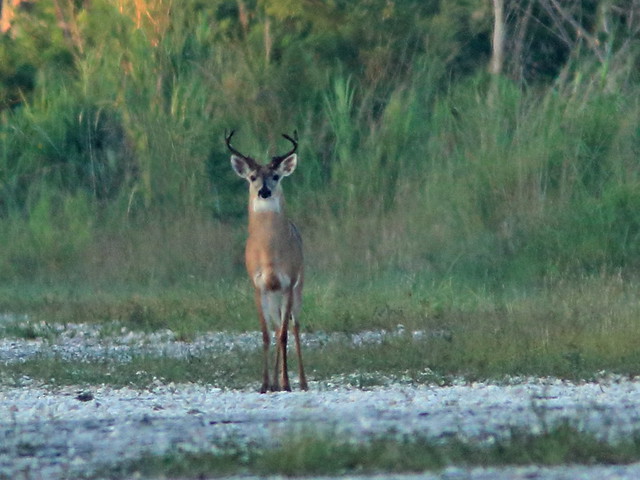
The sun is still well below the horizon, but its light reflects against the high clouds:
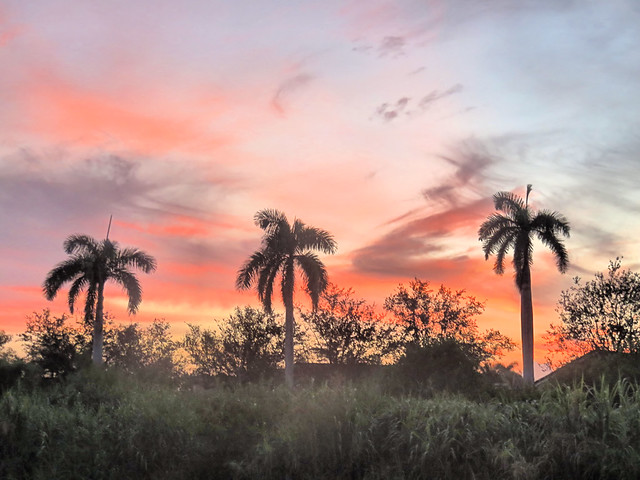
Not many birds are singing in late July. Many have raised their families and are undergoing an energy-consuming molt. While mockingbirds may sing even during the night during breeding season, they are now quite silent.
Adult Northern Mockingbird:
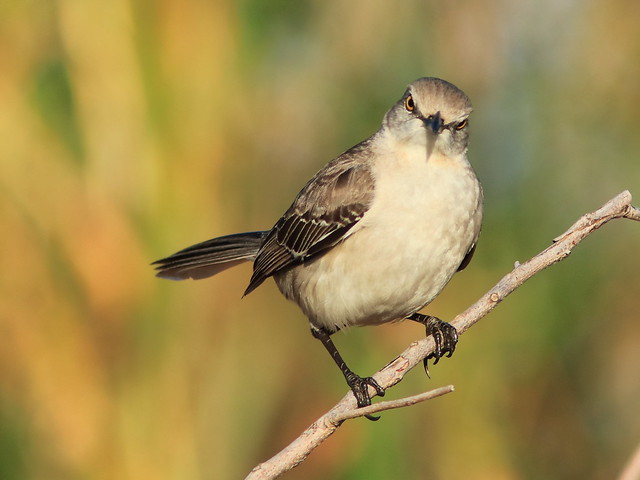
Fledgling mockingbird in June:

An older juvenile mockingbird exhibits a speckled breast:
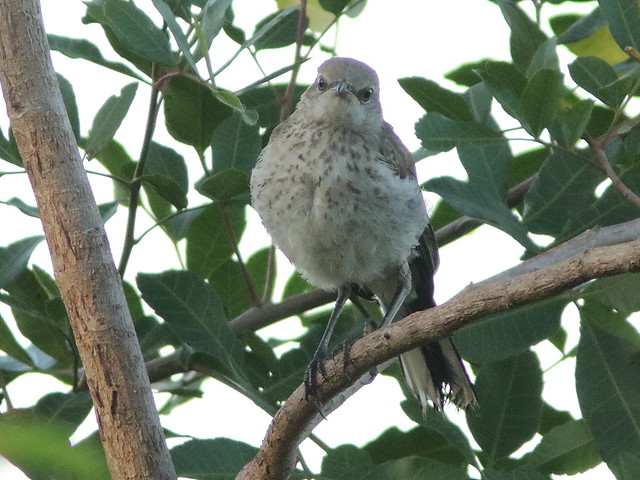
Northern Cardinals are a welcome exception. I can often count a half dozen singing males, some in duets with females, which also sing (as do female mockingbirds):
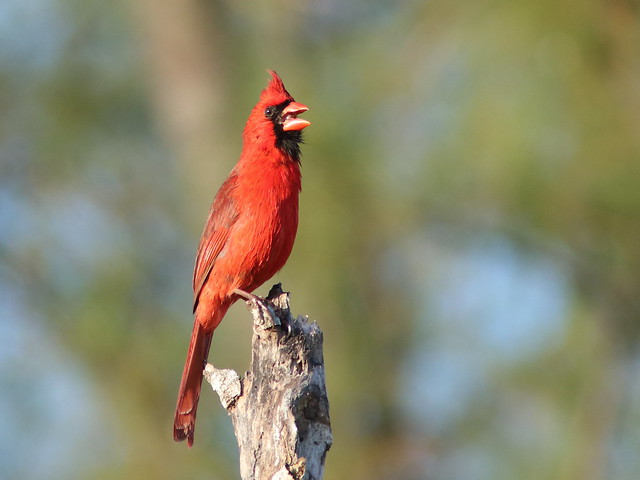
Female Northern Cardinal:
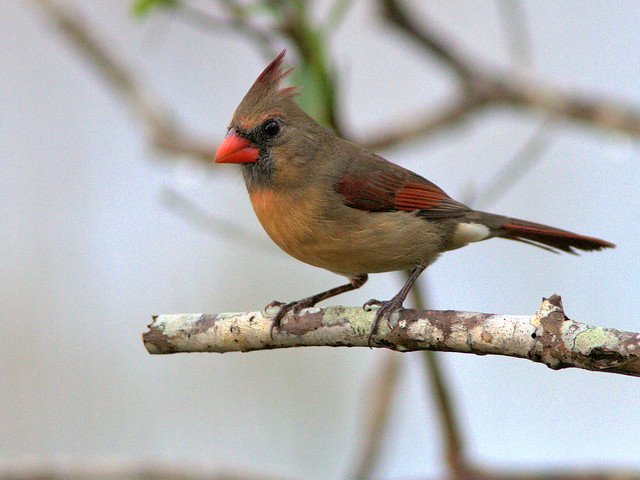
We may hear one or two Carolina Wrens singing despite the heat:
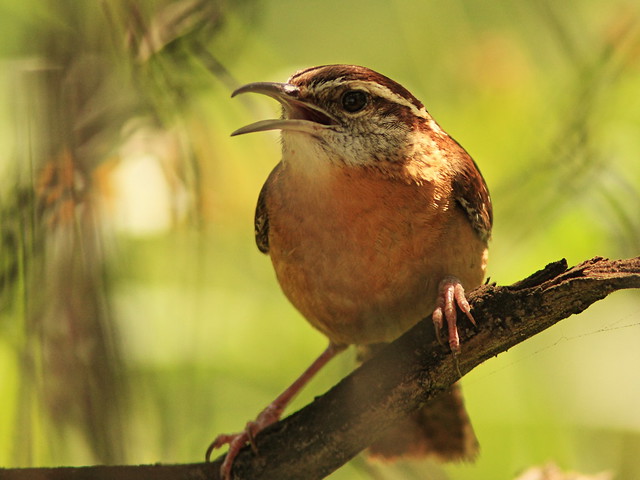
Mourning Doves coo persistently before sunrise...
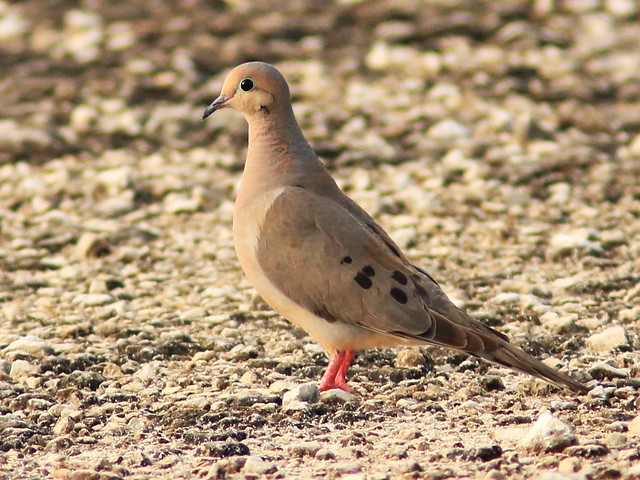
...as do White-Winged Doves. This one used the roof of our home for his performance:
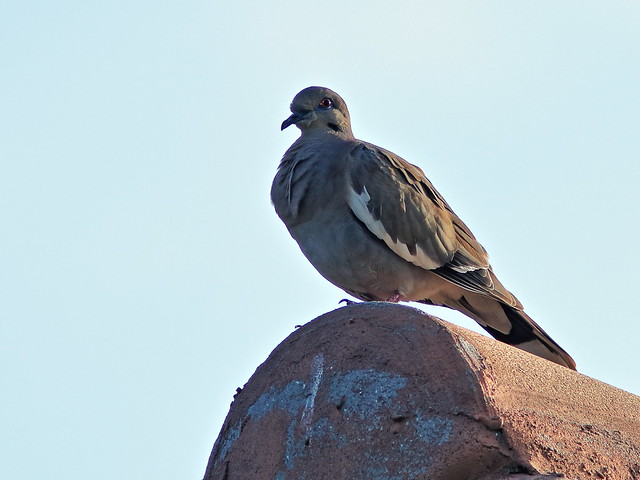
I walk out on the little "peninsula" and just listen. Maybe I will hear a Pileated Woodpecker or a Red-Shouldered Hawk, but only the calls of Blue Jays and Red-bellied Woodpeckers pierce the silence:
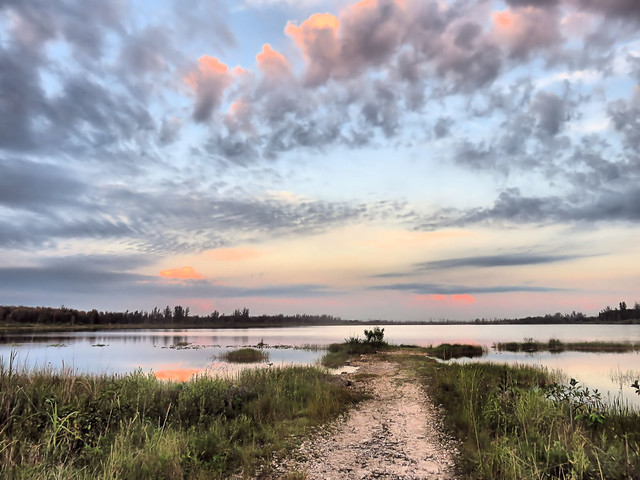
The monotone trill of an unseen Eastern Screech-Owl is like music to our ears and a reward for being out early. This week I heard two calling, about a mile into our walk. One had a more high-pitched voice. It may have belonged to the juvenile owl, which I briefly viewed through the branches of a thicket, about ten minutes before sunrise:
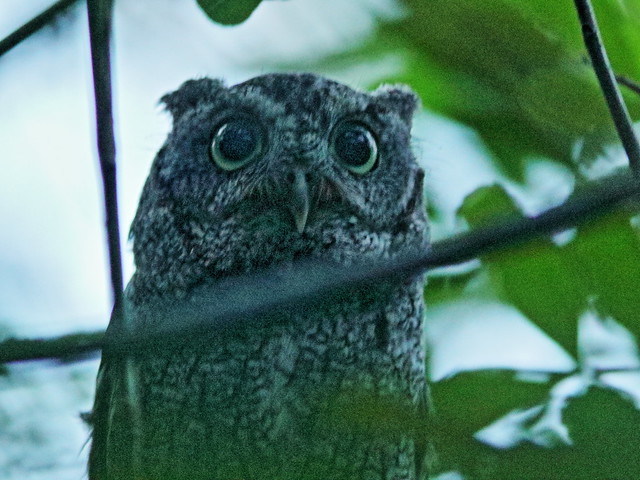
Here is an adult Screech-Owl which paused in better light very near this spot last year:
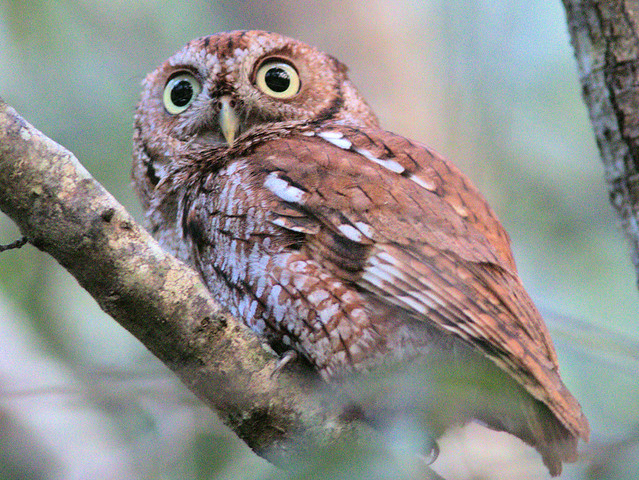
This is the time of year when I sometimes fall short of meeting Birdchaser's Recommended Daily Allowance (RDA) of 20 species
Seeing fewer than 20 species in a morning makes me feel "malnourished." If my list seems to be stuck at 18 or 19, I may delay my return home and risk heat stroke, hoping to see one or two more. It is especially frustrating when I fail to find one of the more common birds, such as a European Starling, or the sky does not contain any vultures or crows. High water discourages wading birds and one morning this week I saw no herons at all.
The fun of birding is not just about "body counts." There is so much to discover at any time of year. One day last week I saw only 15 species but had the thrill of seeing the eaglet from the local Bald Eagle nest suddenly pass low overhead. Why has she not wandered north, as is the habit of south Florida's younger eagles? By July, most of them are following the Atlantic coast up into the Carolinas and Chesapeake Bay, where waters are cooler and fish are easier to catch. Oddly, she is carrying some grass in her talons. Why?
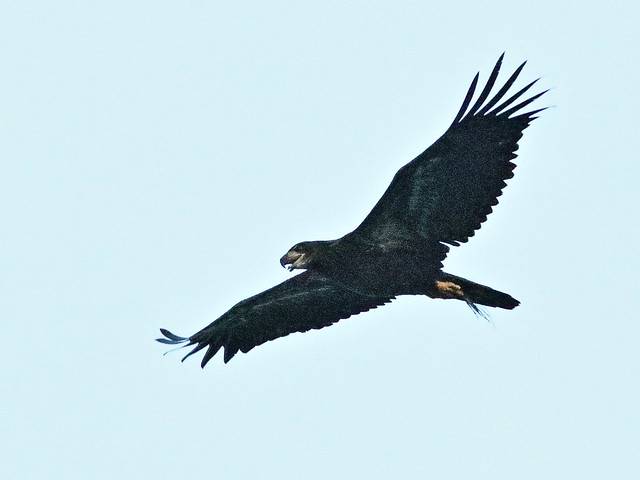
We know she is a female by her bulk and the extension of the gape of her bill below her eye She exhibits first-year (juvenile) plumage: a dark body, dark beak, head and tail, along with white "armpits." Her set of fresh and longer wing and tail feathers cause her secondaries to bulge and add more than an inch to her length. She flies a direct line from the nest tree to a lake in our subdivision. Her lighter wing linings are also visible in these views as she moves away:
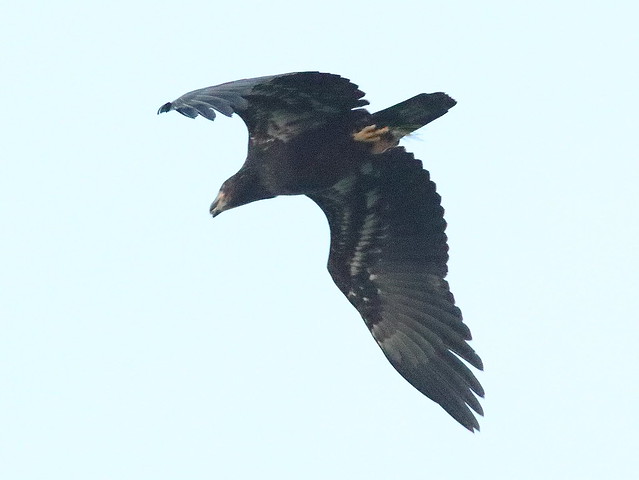
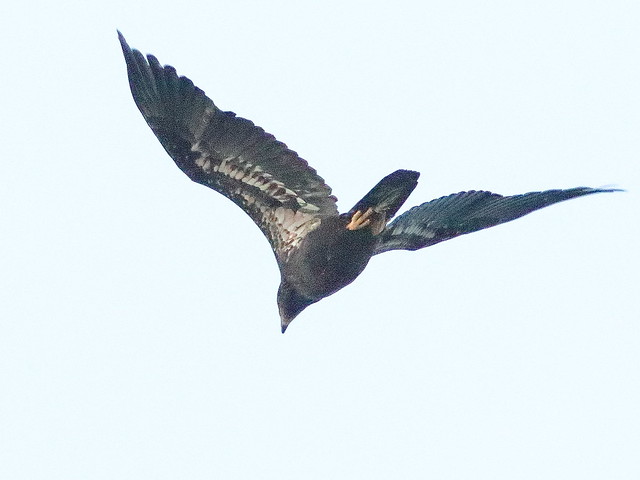
At the lake, the water is still. A Little Blue Heron dashes to find a better fishing spot:
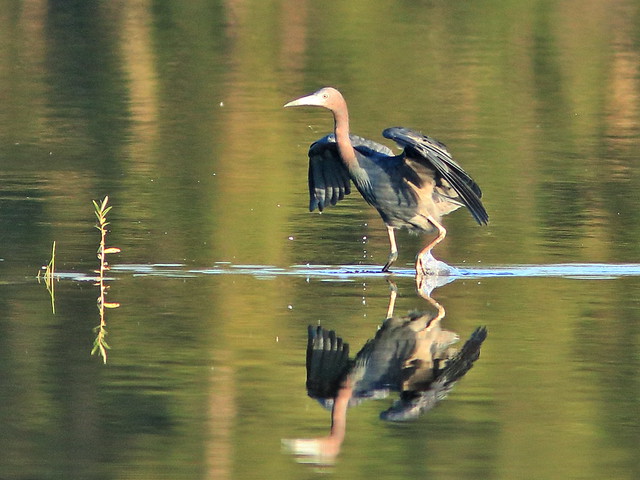
There has been a hatch of White Peacock butterflies. Many seem to be taking their first flights. By tomorrow their wings will be tattered from their constant struggle over territory and mates:
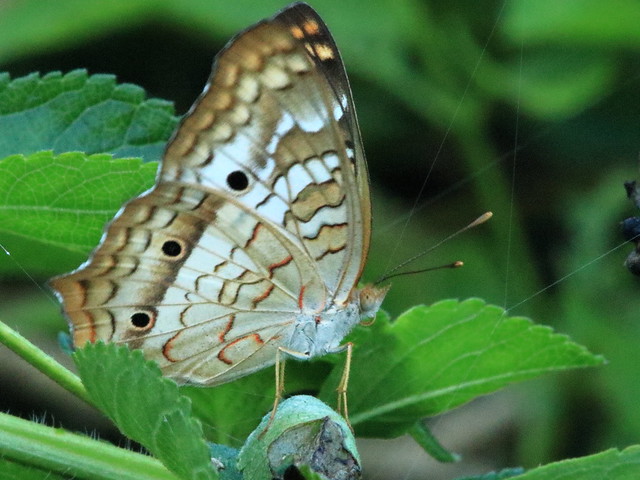
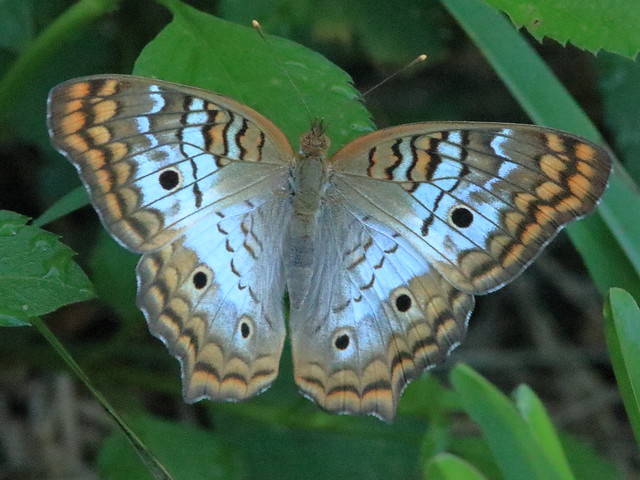
Walking home at 8:00 AM, the restless clouds portend the rain which is sure to arrive by noon:
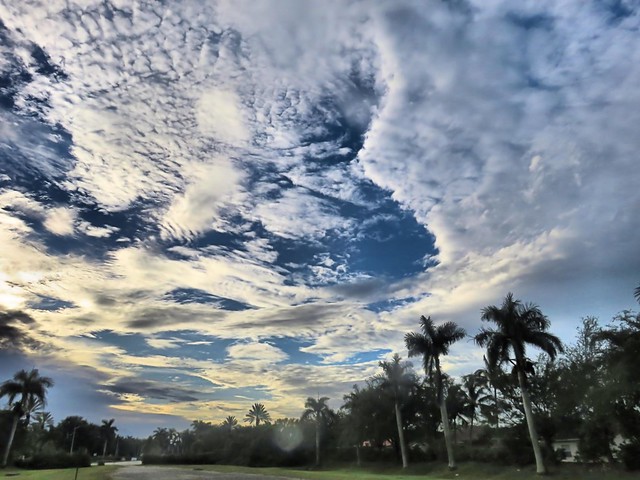
A Northern Curly-tailed Lizard appears at the base of a tree as I exit the wild area. This species, native to the Bahamas, was introduced into Palm Beach County to the north in hopes that it would control insect pests on the sugar cane. It has spread over the southern part of the State, although this was the first I have seen at this particular location. While invasive, they seem not to be a threat to native creatures:
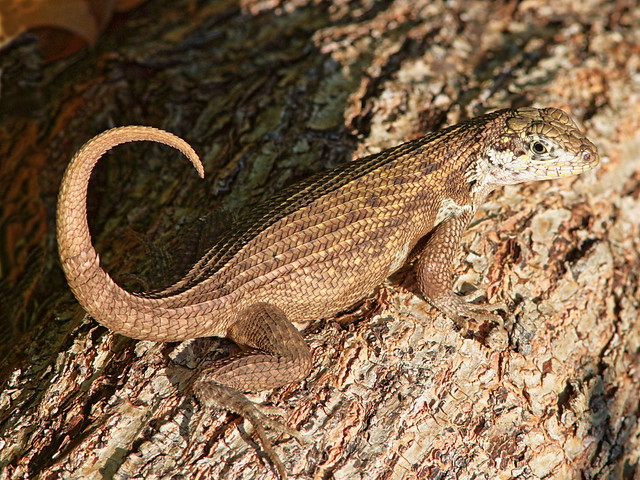
= = = = = = = = = = = = = = =
Linking to Misty's CAMERA CRITTERS,
Linking to Eileen's SATURDAY'S CRITTERS,
Linking to SKYWATCH FRIDAY by Yogi, Sylvia and Sandy
Linking to WEEKEND REFLECTIONS by James
Linking to BirdD'Pot by Anni
Linking to Our World Tuesday by Lady Fi
Linking to Wild Bird Wednesday by Stewart
Linking to Wordless Wednesday (on Tuesday) by NC Sue
Linking to ALL SEASONS by Jesh
________________________________________________
Please visit the links to all these memes to see some excellent photos on display
________________________________________________
Mockingbirds have quite a scowl, don't they?
ReplyDeleteLots of nice shots.
Beautiful set of photos, really like them all and the sunrise shots are very special. Have a good weekend, Diane
ReplyDeleteThe palms against the red sky is such a pretty shot! Love the big-eyed owls too. Enjoy your weekend!
ReplyDeleteHello Ken, your sky photos are stunning. I love the deer. The White Peacock is a favorite. The Owls are an awesome sighting. We do see a lot of eagles in the Chesapeake Bay area, great flight captures. Thank you for linking up and sharing your post. Happy Saturday, enjoy your weekend. PS, thanks for the visit and comment. I remember having to cover our rental car with tarp while visiting the Everglades.
ReplyDeleteVery beautiful captures, as usual.
ReplyDeleteClearly explained.
where in S florida I'm in Sebring- amaing owls i find hard to photograph
ReplyDeleteAn interesting post with wonderful photos! Now that I know about the birder's RDA, I will start counting each day. I will have a good start just counting the birds at my feeders!
ReplyDeleteThe Screech Owl sure is a great sighting! He should count as TWO...or MORE! I still have never seen an owl in the wild! And the curly tail on that lizard is neat! Enjoy your weekend!
ReplyDeleteSuperb shots! I like the looks on some of the bird's faces. :-)
ReplyDeleteFelt like I was on the hike along with you as I read this post. Seemed like you saw a great variety of creatures to me!
ReplyDeleteLOVE those mockingbird shots, and the Carolina Wrens and Screech Owl! Beautiful photos.
ReplyDeleteLovely birds...but oh, that owl!! Like the call of the wild...heavenly!
ReplyDeleteI so enjoyed your post, with my thanks for joining us at I'd Rather B Birdin' this week!
Silly me thinking the mockingbirds in California would look like yours in Florida. I was surprised to see how differences from your photos. I'm also wondering if all birds migrate when it's time. As the father-in-law said to the Husband when he was child, "We don't guess, we go look it up." :-) Off I go.
ReplyDeleteMarvelous post - I love your photography and knowledge.
ReplyDeleteInteresting angle of the deer. The mourning dove is always pretty, and your capture of the owl is amazing! Wow Ken - 20 species? I'm glad when I see one or 2 (of course I'm not focused on seeing birds, and I do not own binoculars). The white peacock butterfly is gorgeous. Wrote you back an email on why the comment section may have (hopefully only temporary!) disappeared. A disadvantage of living at 3000 feet, lol. Many thanks for sharing so faithfully to All Seasons and enjoy your week!
ReplyDeleteThe cloud photo is just incredible! We have a rose dove behind our house.
ReplyDeleteVery nice set of pictures - dawn (or at least early morning) walks are great - best time of the day I think.
ReplyDeleteCheers - Stewart M - Melbourne
Such wonderful photos! Thanks so much for sharing them with us at https://image-in-ing.blogspot.com/2018/07/how-to-make-peanut-disappear.html
ReplyDeleteThese photos are absolutely incredible, such a vast array of wildlife. These pictures are so vivid and clear. Hope you have a fantastic rest of your day, thanks for the share. Keep up the posts.
ReplyDeleteWorld of Animals
You take excellent photos. I love the wildlife shots . I have yet to see an owl in the wild despite that we have many living in our area. I hear them, but haven't seen them. Thanks for the treat
ReplyDelete